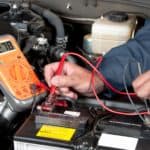
MENUMENU
TALK TO AN EXPERT
Special Hours: 7AM – 6PM PST
TALK TO AN EXPERT
Special Hours: 7AM – 6PM PST
Batteries do so much for us, from starting our vehicles to powering our flashlights during power outages. But different types of batteries can have dramatically different strengths and intended uses. And for those who aren’t particularly knowledgeable about tech, it can get a little confusing. One of the most common varieties you’ll hear about is a deep-cycle battery. But just what is a deep cycle battery? Let’s find out.
Deep cycle is a terminology used to distinguish a certain type of battery but not an actual set of design parameters that specify a certain type. Generally, this type of battery is designed to produce steady, reliable power over long periods. This contrasts with starter batteries, which produce short, powerful bursts of energy.
You will commonly find deep cycle batteries in golf carts, boats, RV house batteries, solar power storage, electric wheelchairs, and many more applications. In addition, these batteries are rechargeable, so you can reuse them many times if you care for them properly.
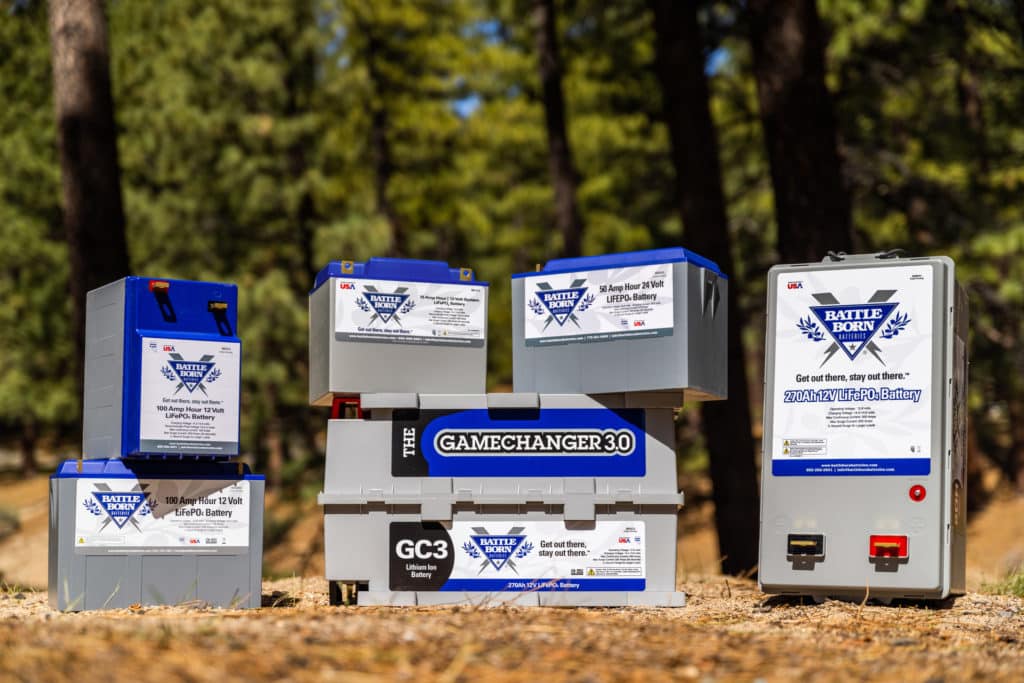
One of the reasons you may be asking this is to identify which type of battery you currently have. As the deep cycle is just a terminology that has been used over the years, the battery may or may not be labeled as such. Basically, any battery designed for deep discharges is a deep cycle.
Most lithium batteries, like our Battle Born line, are excellent deep-cycle batteries. This is because they can discharge 100% and still be fine. In fact, this is the best-case scenario for a deep-cycle battery.
The only way to tell if a lead acid battery is a deep cycle is by its label. These batteries have slightly thicker lead plates and separators that help them survive the stresses of a deep discharge. While they can technically do it, they experience severe degradation with each deep discharge cycle beyond 50%.
You can also measure the current they produce under load. Deep cycle batteries provide a lower, steadier current than the bursts of a starter. The easiest way to ensure you have the correct type of battery is to consult a knowledgeable expert where you purchased your battery.
The special nature of deep-cycle batteries is right in the name! Unlike other batteries, they can provide a level of power that’s stable over long periods of hours or days. In addition, they provide enough energy to run numerous power-intensive systems. No other battery can work in this way to power RV and boat electrical systems, store and discharge solar energy, and for other powerful, long-term uses.
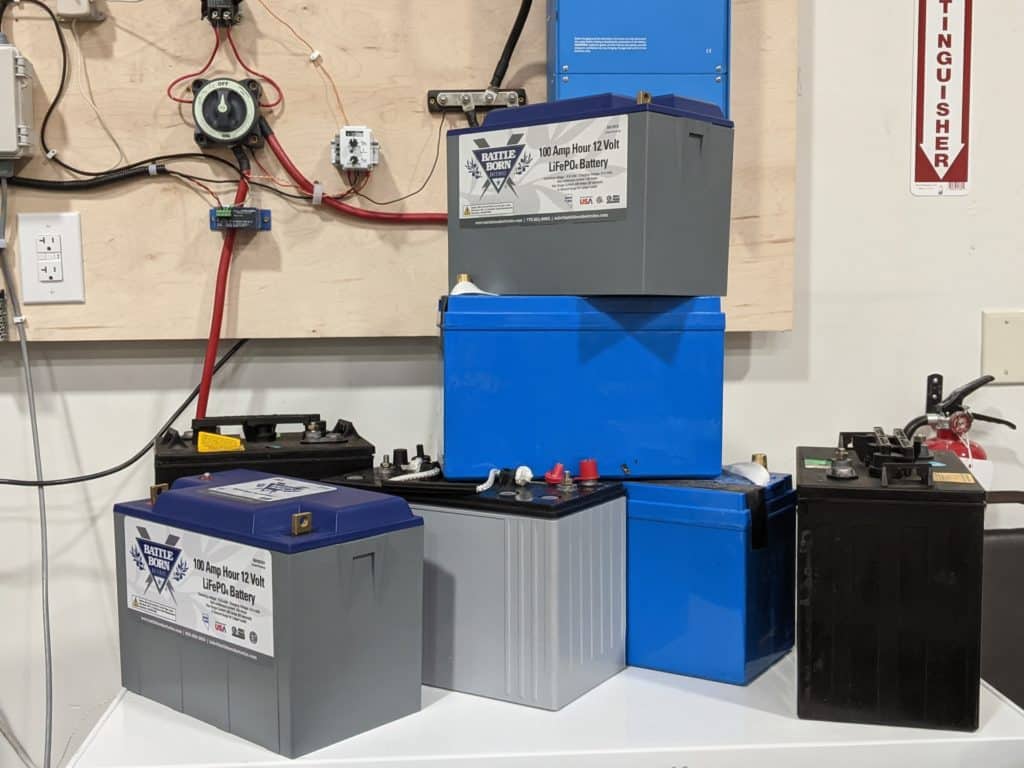
To answer this, we need to take a bit of a closer look at the different types of batteries. Each has unique benefits but also some potential drawbacks.
Lithium deep-cycle batteries are the cream of the crop for most applications. They’re lightweight, provide high energy storage relative to their size, and can operate in all sorts of conditions. Unlike old-school batteries, you can discharge them fully without damaging them. They’re also significantly faster to recharge.
Like all batteries, lithium-ion ones create electricity through the flow of energy between a positively charged cathode and a negatively charged anode. However, lithium batteries use a different chemical process, resulting in their unique advantages.
While lithium batteries remain pricier than other battery types, owners often find the price difference worth it in the long run. These batteries have a significantly longer lifespan, meaning you’ll purchase fewer batteries over time.
AGM batteries represent a technological improvement over the original design of these types of batteries. Rather than a free-flowing electrolyte solution, AGM batteries hold it within an absorbent glass mat (AGM). For many, they’ll offer a good combination of improved performance and moderate price.
Flooded lead-acid batteries are the oldest and most restrictive battery technology in regular use but are still a very common choice. Unlike lithium or AGM batteries, they require regular maintenance. Users need to open up the battery to top off the electrolyte solution to proper levels or risk serious damage.
This unsealed construction also limits how and where you can install and mount them. Their primary advantage is that they’re more affordable than other battery options. Still, they also tend to have the shortest lifespan and are the most easily damaged by operating outside their required conditions.
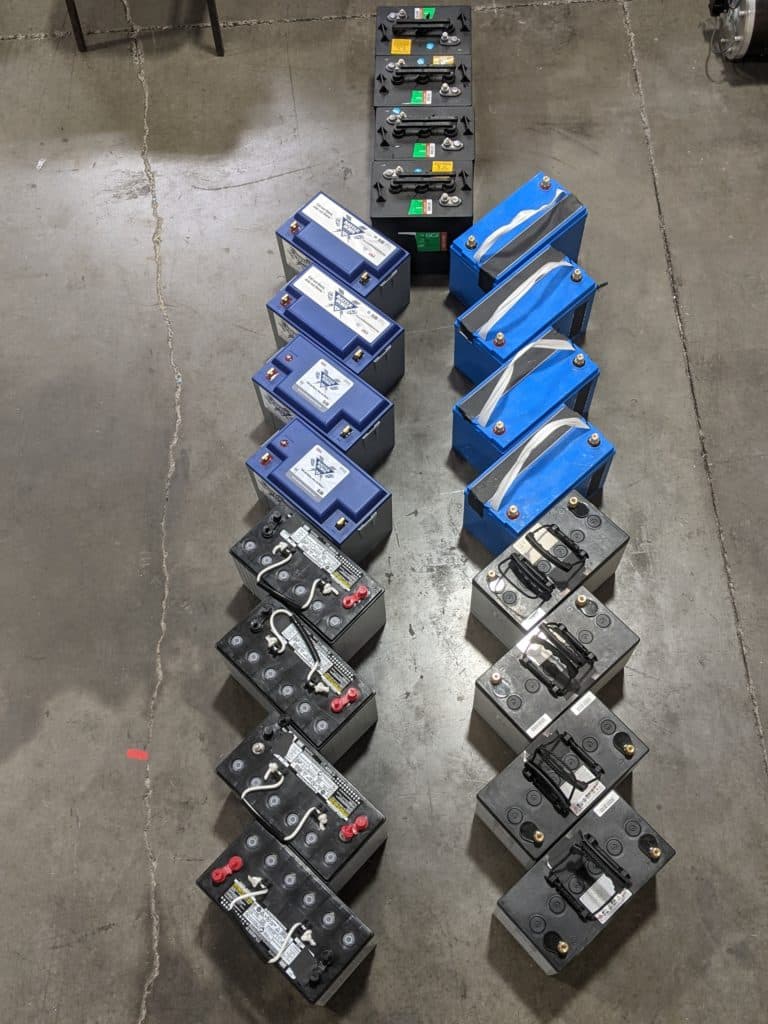
These batteries can hold their charge relatively well when not in use. Still, users of lead-acid batteries should expect to lose 10-35% of the battery’s power monthly without any intervention. Lithium batteries are superior in this aspect, only losing about 2-3%.
If you plan not to use your battery for a long time, consider connecting it to a trickle or float charger. Trickle chargers supply a tiny but constant amount of electricity to your battery to prevent problems from over-discharging. In contrast, more sophisticated float chargers monitor your battery charge level and only provide energy when the battery can accept it without overcharging.
The answer to this question will depend on the type of deep-cycle battery you use. Lead-acid batteries should be charged after every use as basic maintenance. Doing this reliably will help extend the batteries’ lives.
Lithium batteries offer the advantage of not needing to recharge immediately after each use. They’ll suffer no short- or long-term damage by being left in a less-than-full state of charge.
Unfortunately, you can overcharge a deep-cycle battery. However, lead-acid and lithium batteries will face different risks, even if both will see the degraded performance through persistent overcharging.
Lead-acid batteries will emit hydrogen sulfide gas, which is poisonous and flammable. Significantly overcharged lithium batteries can face a condition known as thermal runaway, leading to extremely hot and dangerous fires that can be very difficult to put out. However, many lithium batteries including our Battle Born Batteries, have an internal battery management system (BMS) that protects the battery from overcharging.
Every single one of our Battle Born Batteries is quality control tested with overcharge tests before they go out the door.
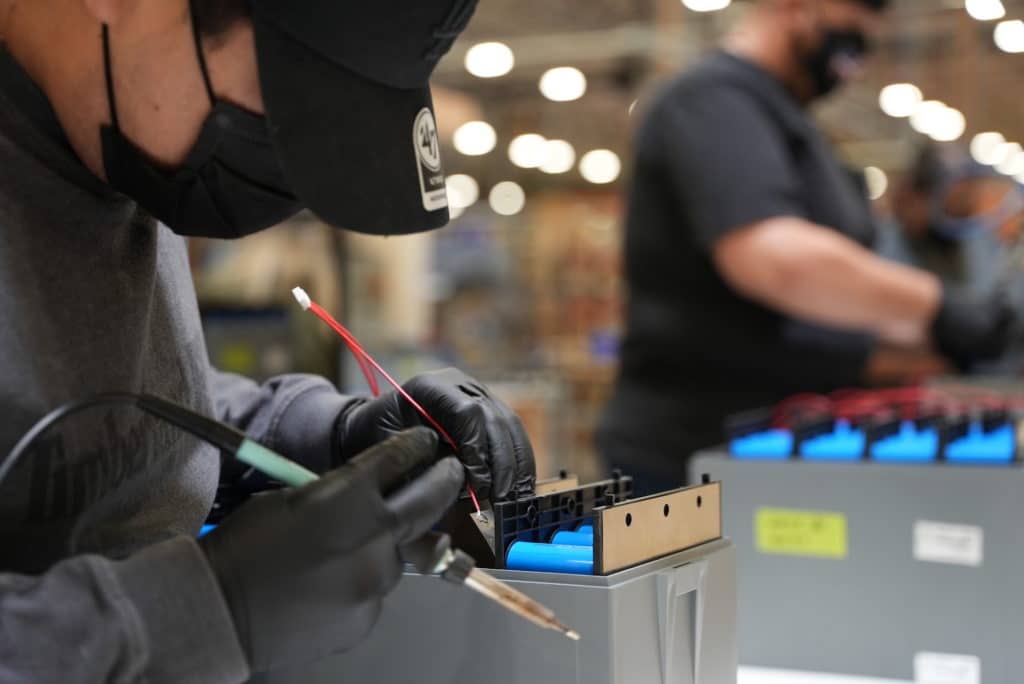
Generally, you can use most deep-cycle batteries for jump-starting a vehicle if the need arises. However, this isn’t their strength, and you should choose another option if you can.
In addition, you should never jump-start deep cycle batteries of any variety. The jumping process should only be used when quick bursts of energy are needed to get a motor or other device going. To revive a deep-cycle battery, use a battery charger to recharge the battery per manufacturer specifications.
Battery lifespan is usually calculated in cycles. A cycle is any time the battery is discharged and then recharged. A battery could cycle once a day or once a month. The more frequently a cycle, the shorter the time lifespan. Most lead acid batteries provide 80% of their original capacity for 300-500 cycles when charged fully each time. At one cycle a day, their lifespan could be as short as one year.
Lithium tends to be the longest-lasting of all battery types, sometimes lasting five to ten times as long as their lead-acid counterparts. Battle Born lithium batteries have lifespans of 3000-5000 cycles before reaching 80% of their original capacity. At one cycle per day, this is 10-plus years. Also, they degrade much slower, so a lithium set may still be viable for much longer, even with regular use.
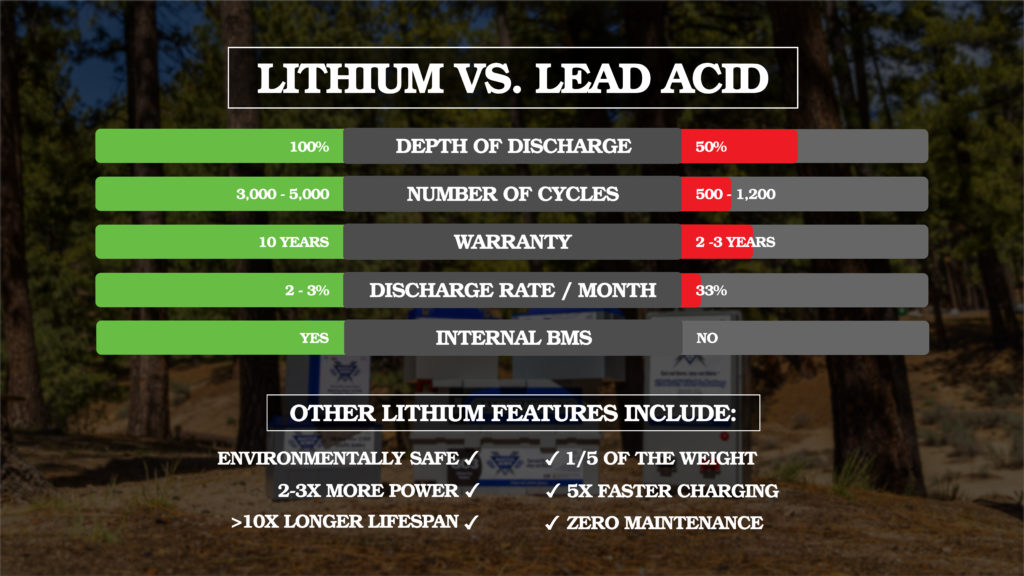
For many applications, there’s simply no substitute for a deep-cycle battery. Other battery types simply can’t provide the same steady, reliable energy over extended periods, helping you power your boat, RV, golf cart, or any number of other devices and systems. But of course, not all are equally suited for all purposes.
While many still opt for old-school flooded lead-acid batteries, these are no longer the best bet, even for the budget-minded. Lithium batteries far outperform their lead-acid counterparts in energy density, lifespan, usage in extreme conditions, and other categories. As a result, this helpful technology will no doubt continue to grow its share of the battery market in the years and decades to come.
We know that building or upgrading an electrical system can be overwhelming, so we’re here to help. Our Reno, Nevada-based sales and customer service team is standing by at (855) 292-2831 to take your questions!
Also, join us on Facebook, Instagram, and YouTube to learn more about how lithium battery systems can power your lifestyle, see how others have built their systems, and gain the confidence to get out there and stay out there.
Shop Best Sellers

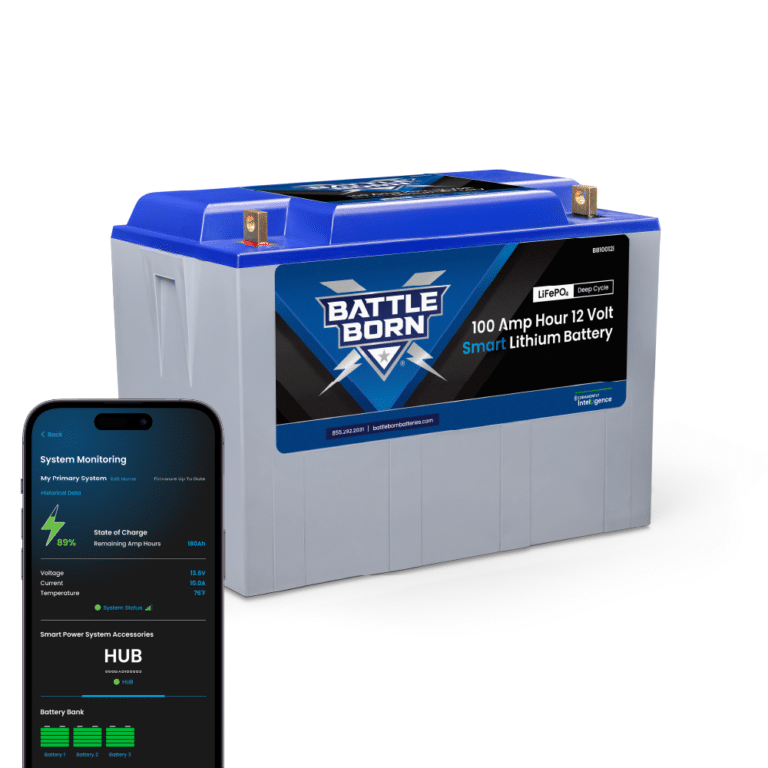

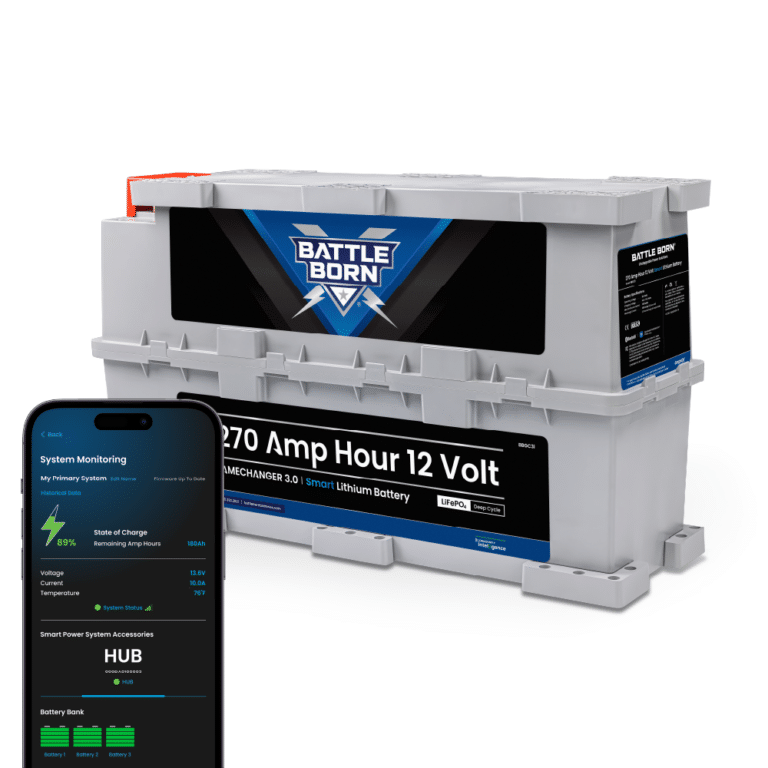




Ask a technical specialist now at 855.292.2831
Stay in the Know